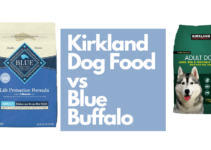TLDR: Yes plain bagels are safe in small quantities, but it’s not recommended. Other types of bagels like poppy seed and everything bagels can cause indigestion and other health problems.
If you’re like most dog owners, you probably view your furry friend as a member of the family.
And just like any other member of the family, you want to make sure they’re healthy and happy.
That’s why it’s important to know what foods are safe for dogs to eat—and which ones aren’t.
Bagels are a common breakfast food, but can dogs eat them?
Let’s take a closer look at the risks of feeding your dog a bagel.
Are bagels safe for dogs?

Bagels are a type of bread that is boiled and then baked. They’re often topped with cream cheese, making them a tasty treat for humans.
However, before you give your dog a bite of your bagel, there are some things you need to keep in mind.
Firstly, bagels are high in carbohydrates, which can be difficult for dogs to digest (in addition to having little nutritional value).
In addition, many kinds of cream cheese contain xylitol, which is toxic to dogs and can cause serious health problems.
Finally, the baking process can make bagels hard and difficult for dogs to chew.
If your dog does manage to eat a bagel, it may end up choking on it or developing gastrointestinal issues.
Other considerations: Toppings & Bagel Types
Poppy seed bagels, onion bagels, everything bagels (and similar bagels)

They may look harmless, but they can actually pose a serious threat to your dog’s health.
Poppy seeds contain opiates that can cause indigestion, vomiting, and diarrhea in dogs.
The onion and garlic in all bagels can also cause gastrointestinal upset in some dogs.
Can dogs eat blueberry bagels (or other fruit-based bagels)?

Blueberry bagels and other fruit-based bagels may seem like healthy options, but they can actually be dangerous for dogs.
The blueberries in blueberry bagels can cause gastrointestinal upset and vomiting in dogs.
Other fruits like raisins and grapes can be toxic to dogs and should be avoided.
Is cream cheese safe for dogs?

While plain cream cheese is safe for dogs in small quantities, many kinds contain xylitol, which is toxic to dogs.
Xylitol can cause a rapid drop in blood sugar, leading to weakness, loss of coordination, and seizures. In severe cases, it can even be fatal.
If your dog consumes cream cheese that contains xylitol, it’s important to seek veterinary care immediately.
Conclusion: So, can dogs eat bagels?
It’s not recommended.
While bagels may not be lethal to dogs, they can certainly cause an upset stomach, indigestion, and other health problems.
It’s always best to err on the side of caution when it comes to feeding your furry friend—after all, you want them around for as long as possible!
What should I do if my dog ate a bagel?
If your dog ate a small plain bagel with no toppings, it will probably be fine.
However, if they ate a bagel with cream cheese or any other topping, it’s important to seek veterinary care immediately.
Xylitol is toxic to dogs and can cause serious health problems—even death. So, it’s better to be safe than sorry!
Additionally, keep an eye on your dog for any signs of gastrointestinal distress. If they vomit or have diarrhea, contact your veterinarian right away.
FAQ
Can dogs eat poppy seed bagels?
No. Poppy seeds can be toxic to dogs and can cause problems with their digestive system.
Can dogs eat everything bagels?
No. Everything bagels contain a variety of spices that can be harmful to dogs if ingested in large quantities.
Can dogs eat plain bagels?
Plain bagels are safe for dogs to eat in small quantities. However, they should not be a regular part of your dog’s diet.
Can dogs eat cream cheese?
Cream cheese is safe for dogs to eat in small quantities. However, it contains xylitol, which is toxic to dogs.





